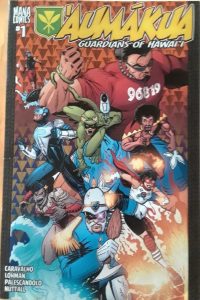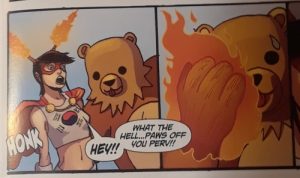Think global, buy local, they tell you. Aurite*.

It’s been a long time since I bought a comic book that wasn’t wrapped in a brown paper bag. It’s not what you think. After a dry spell, a few years back I bought a couple packages of 10 titles for a buck and gave them to the kids to see if they had any interest in comic books.
They didn’t.
That confused me until I read a few myself and realized that Marvel and DC had undergone the same tectonic shift away from adventure stories and towards virtue signaling and ‘adult’ themes. That experience chased my whole family away from the medium for five years. Between the rise of Alt*Hero, the analysis of SJW comics provided by Diversity and Comics, and rubbing elbows with some solid and cool hard core comic fans online, I found myself with a hankering for a hit of sequential art that had long lain dormant.
My first choice was Alterna Comics, a smaller publisher that uses news paper, charges less than two bucks a title, and has a fun and engaging presence on the Twitter machine. Unfortunately, my comic shop does not carry them – they probably will soon as I asked for them by name, and the clerk said I’m not even close to being the first. Undaunted, I decided to go the local route and picked up the first issue of ‘Aumakua: Guardians of Hawai’i.
Page one got off to a tense start. The one page backstory presents a deep and meaningful nod to the local Hawaiian folklore and explains that long ago the Native Hawaiians knew that someday people would try to steal their land, and that the gods responded by sending the Aumakua, mighty warriors of legend sent to defend the land. Presumably from people like me, but whatevs. On page two, we learn that the modern iteration of the defenders (shown above) are not the soulful saints of a Black Panther or a Luke Cage, they are a definite work in progress.
The basic premise of the story is simple – a giant not-at-all-Godzilla attacks Honolulu during the biggest nerd convention in town. Which leads to the first of a couple of genuine belly laughs the comic provides. One grateful attendee decides to personally thank Seoul Hot, a Korean and fire-themed superheroine, a little too personally.

Surprise! PedoBear reference for the win. A couple of the other jokes are a little too fourth-grade potty-humor for my tastes, but in a nice touch, the Hawaiian Superman – Mighty Moke would be the guy with the afro shooting the shaka (that’s “Hang Loose” for you mainlanders) on the cover – shows up late to the party. Which leads to one team-member pointing out that he arrived, “Just in the nick of Hawaiian time.” Might not mean much to most people, but trust me, that joke kills on this island.
Which brings us to the elephant in the room. The cover features five different ethnicities, which would be red flag of danger on a mainstream comic book. Handled by a team of stiff-necked New York creatives, this comic book would be overbearing, preachy, and insufferable. Handled by a team of laid back island kine goofballs, this comic book is light, fun, and engaging. Looking at the cover you’ve got a (presumably white) surfer, a Samoan, a Hawaiian braddah, a Korean girl, two more Hawaiians, a Portugee supergenius, and I think a white guy in a gecko suit. None of the masked superheroes take off their disguise, so it’s a little hard to say for sure. And that’s okay. This is one of those titles written to reflect strange mélange of cultures that has sprung up in Honolulu over the last 250 years as it has served as a city where East meets West.
More to the point, the creative team doesn’t view these characters as paragons of representation whom they dare not insult by giving them weaknesses or challenges. The Superman analog – Might Moke – is late to the fight. He is arrogant. He is rash. His heart is in the right place, but he is young and needs the stern, guiding hand of The Royal Hawaiian Guardian (the old man in the Pith Helmet) to keep him on the straight and narrow. It’s the sort of thing you don’t see in more mainstream comics, and that absence is part of the reason for the decline of the major publishers. Interestingly, the creators of this comic, by treating the issue of representation so lightly, have tapped into something deeper than the midwits who strive to make the world a better place through purse puppy writing.
Although eight characters is a little crowded, each hero receives just enough center spotlight time to introduce himself and do something cool. Only a couple have a character moment more than superficial, but it works within the “pilot episode” context. A lot of the dialog is in pidgin**, which may make it a little harder for non-locals to follow, but if you aren’t stupid, you can translate into King’s English easily enough.
If you have a love for the modern Hawaiian islands, and you want to pair that with your love of comic books, this one is a keeper. It’s fast, fun, and adventurous, and everything that a comic book should be. I’ll be picking up the next couple of issues in the series to read for pleasure (rather than as an autopsy on what not to do), and ultimately that’s the best measure of a comic book’s success.
*Pidgin for “All right.”
**The local bastardized dialect that features a lot of dropped prepositions, a refusal to pronounce “th” as anything other than a “d”, and a lot of slang. The comic includes a glossary at the back, which includes a full translation of a three panel Hawaiian language argument. The translation is in-necessary as the art and body language of the characters makes the meaning plain enough, but it’s a nice bit of service for fans who prefer to have everything spelled out.
